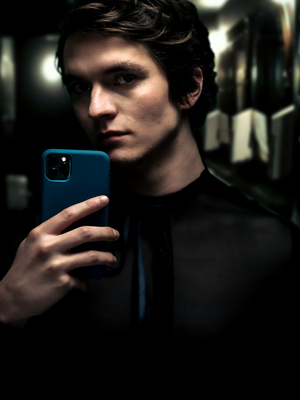Review: THE PICTURE OF DORIAN GRAY, Online
Fionn Whitehead and Joanna Lumley star in digital adaptation

![]() Adapting classic works for the modern day is a double-edged sword. The usual risk is a clash between a hip makeover and situations that stay too rooted to their original framework. Not in Henry Filloux-Bennett's take of Oscar Wilde's The Picture of Dorian Gray, which has arrived as a collaboration between five regional theatres. He reframes beauty and popularity for a technology-centric age where our digital lives have essentially taken over.
Adapting classic works for the modern day is a double-edged sword. The usual risk is a clash between a hip makeover and situations that stay too rooted to their original framework. Not in Henry Filloux-Bennett's take of Oscar Wilde's The Picture of Dorian Gray, which has arrived as a collaboration between five regional theatres. He reframes beauty and popularity for a technology-centric age where our digital lives have essentially taken over.
Directed by Tamara Harvey, Wilde's most famous characters are here deeply embedded in this new normal. Harry Wotton (Alfred Enoch) and Lady Narborough (Joanna Lumley) are being interviewed about the suspicious circumstances surrounding Dorian Gray's death. Stephen Fry is the agile Interviewer of the confessional-style documentary, seen only on the interviewees' screens as he urges the pair to come clean. As the two retell the incidents leading up to the tragic ending, we meet Dorian through their memories.
Fionn Whitehead is our protagonist, here a university student with an unsuccessful YouTube channel who's stuck in his accommodation due to Covid. His shoddy bedroom exists in stark contrast to Wotton's opulent drawing room and Lady Narborough's sophisticated environs. Filloux-Bennett introduces Basil Hallward (Russell Tovey) as a married software developer who wants to be considered an artist. He professes his love for Dorian through presents and money, and we instantly notice the competitive qualities of Dorian's friendships, revealing their shallow and opportunistic nature.
As in the novel, one of Basil's seemingly innocuous gifts sets the tale on its tragic path, and his mental health worsens as his social media presence is amplified. His friendships start to suffer, and Sibyl Vane (Emma McDonald), an aspiring actress encountered at Lady Narborough's fundraiser, becomes the first casualty of Dorian's newfound ruthlessness.
Harvey makes the best of the pandemic's ongoing theatrical limitations. The actors are hardly ever together thanks to such technological expedients as video-calls and texting. Nor do these exchanges ever feel contrived, thanks to Benjamin Collins's captivating editing and gorgeous photography, while Harry Smith's original score and sound design lend a genuine murder-mystery vibe.
As Dorian, Whitehead (of Dunkirk fame) becomes truly interesting when his heartless side takes over. After a start imbued with feeble charisma and not much personality, the character's modern-day fixation with subscribers and a gatheringly villainous online presence unleash Whitehead's acting chops. While the production features such notables as Lumley and Fry, Enoch steals the show as a flirty, flamboyant, unabashed posh boy who brings out the homoerotic hues of the story but can also be surprisingly reflective.
Social media, interestingly, isn't here seen as the villain; rather, the emphasis is on the obsession with perfection and the contemporary focus on the digital self. The aftermaths of Dorian's deeds don't appear on any physical picture or portrait, but on the boy himself. While his photos and videos remain immaculate and beautiful, he withers in real life. Marks appear on his face and rumours about his appearance start to roam the internet as we reflect on our new online reality and the value system that exists alongside it.
This version of The Picture of Dorian Gray is certainly ambitious both in its message and in its craft. Like Filloux-Bennett's previous What A Carve Up!, it exists in that new grey area between film and theatre as an exceptional hybrid: an impressive, clever, and, yes, thoroughly aesthetic feat.
The Picture of Dorian Gray is streaming online now until 31 March.
Reader Reviews
Videos

